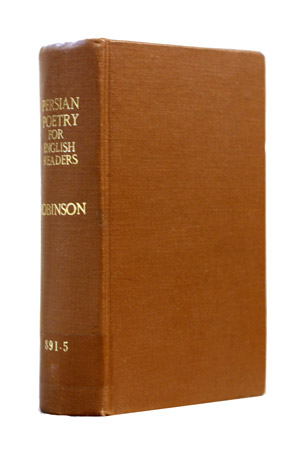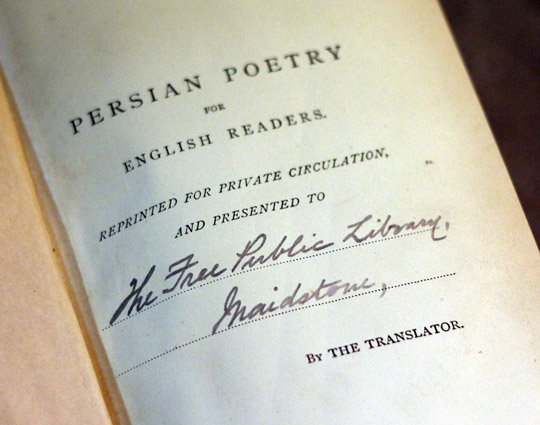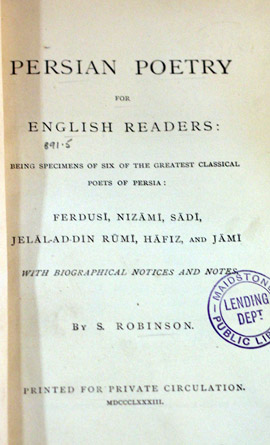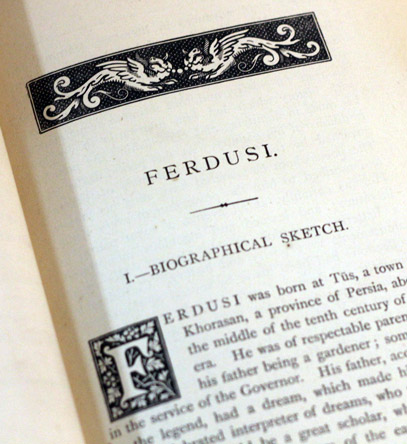Limited to 300 copies, first and only edition. Gifted by translator to the Free Public Library of Maidstone. Very, very scarce.
A fantastic collection of poems – both the most celebrated and the most obscure – from Persia’s six greatest poets. Some of these poems are impossible to find in English even today. Contains the earliest translations of some of Rumi’s poems into English.
Author’s Preface:
Whilst yet in my early days, the life of Sir William Jones fell into my hands. By the reading of that, and his Commentaries on Asiatic Poetry and his other writings on the subject, I was bitten with a taste for Oriental Literature. This naturally led me to wish to read, in the original words, passages which had particularly struck me, and to know something of the languages in which they were written ;especially the Persian, with which I forthwith began to form an acquaintance. Then, for my own pleasure and improvement, I made occasionally versions of what had pleased myself, and might please others also, who had no time or inclination to study the languages themselves, but who might not be sorry to gain some general knowledge of what they contained of interest and information. I was accordingly tempted to print a very small edition of extracts from five or six of the most celebrated Persian poets, with short accounts of the authors, and of the subjects and character of their works.
CONTENTS
F E R D U S I
I. Biographical Sketch
II. Character of His Writings
III. Zal and Rudabah
An Episode of the "Shah-Namah"
IV. Miscellaneous Specimens of the "Shah-Namah"
The Death of Dara (Darius)
Iskandar's Conversations with the Brahmins
Nushirvan's Address to the Grandees of Iran
From Nushirvan's Letter to his Son Hormuz
From the Mubid's Questions to Nushirvan, and his Replies
1. Children and Kindred
II. Destiny
III. How we may best serve God
The Raja of India sends a chessboard to Nushirvan
Ardashir's Address to the Nobles of Persia
Last Words of Ardashir to his Son
The Gardens of Afrasiab
Introduction to the History of Hormuz
Reflections on Old Age and Death
N I Z A M I
Preliminary Notice
Part First : His Life and Writings
I. Establishment of the Dates
II. Lineage of Nizami — his "Storehouse of Mysteries"
III. The Khosru and Shirin — Kizil Arslan
IV. Laila & Majnun — The Prince of Shirvan — Nizami as Husband & Father
V. The "Alexander-Book"
VI. The Heft-Paikar— Nizami's Death
Part Second : The " Alexander-Book:"
I. Retrospect
II. The Sources from which Nizami drew
III. Apollonius of Tyana in the Alexander-Saga
IV. The Introductory Narratives
V. Alexander as Philosopher
VI. Alexander's Call to be a Prophet — the Books of Wisdom
VII. Commencement of the Journey — March to the West
VIII. March through the South
IX. March to the East
X. March through the North — El-Dorado
XI. Sickness and Death of Alexander
XII. Fate of Alexander's Relatives and of the Seven Wise Men
Additional Specimens
S A D I
Preliminary Notice
I. The "Gulistan," or Rose-Garden :
From the Introduction
From the First Chapter — The Qualities of Kings
From the Second Chapter — The Qualities of Devotees
From the Third Chapter — The Excellency of Contentment
From the Fourth Chapter — The Advantages of Silence
From the Fifth Chapter — Love and Youth
From the Sixth Chapter — Weakness and Old Age
From the Seventh Chapter — The Effects of Education
From the Eighth Chapter — Maxims for the Conduct of Life
II. The "Bostan," or Pleasure-Ground :
Introductory
From Book I. — On Uprightness and Government :
The Tiger-Tamer
Last Words of Nushirvan
Kingly Actions
Kingly Duties
The Frugal Monarch
Inscription on the Fountain of Jemshid
The Grandee and the Beggar
Tokiah's Counsellor
Reply of a Devotee to a Complaining Sultan
Unselfishness
Selfishness
The Poor Man's Burthen is less heavy than the King's
From Book II. — Benevolence and Compassion :
Introductory
Orphanage
Abraham and the Fire-Worshipper
The Wise Man and the Cheat
The True Works of Piety
Humanity
The hard-hearted Man punished
Shabli and the Ant
Live not on the Labour of others
From Book III. — Love :
Introductory
Humility : the Glow-worm
The Unjustly Punished
The Moth and the Taper
The Same Subject
From Book IV. — Humility :
Introductory
Humility
The Sinner and Jesus
From Book V. — Submission to Good Counsel :
Introductory
The Camel and her Foal
From Book VI.— Contentment :
Introductory
The Father and his Infant
Be Prepared for Vicissitudes
From Book VII. — Moral Education and Self-control :
Introductory
Keep your own Secret
Speech and Silence
Calumny worse than Theft
How to bring up a Son
From Book VIII. — Thankfulness
Introductory
King Toghrul and the Sentinel
From Book IX. — Conversion :
Introductory
The Gold-finder
The Two Enemies
Sadi and the Ring
The Bad Man and the Sheikh
Ask Pardon in Time
Sadi at the Grave of his Child
From Book X. — Prayer :
Introductory
Supplication
NOTES
J E L A L - A D - D I N R U M I
Preliminary Notice
Specimens of "The Mesnevi:"
Divine Affections
The Lovers
The Merchant and the Parrot
H A F I Z
Preliminary Notice 335
A Hundred Ghazels (or Odes) from his Divan
Notes
J A M I
Preliminary Notice
Joseph and Zulaikha :
Invocation
The Divine Greatness
The Being of God, and Exhortation to labour in His service
Praise of God
The Poet's Prayer
The Prophet's Journey to Heaven
Beauty
Love
Adam's Vision
Joseph
Zulaikha
Zulaikha's First Dream
Silent Sorrow
Zulaikha's Second Dream
Her Third Dream
The Ambassadors
The Messenger and the Departure
Deception
Beginning of the Brothers' Envy
Joseph's Dream
Artful Counsel
Deceitful Request
The Well
The Caravan
The King of Egypt
Intelligence
The Slave Market
Bazigha's Daughter
Love's Services
Love Refused
Questionings and Answerings
The Nurse
The Exculpation
The False Accusation
The Suckling
Repentance
The Visit to the Prison
The Terrace
The Two Officers of the King
The King's Dream
Joseph's liberation from Prison
The True Faith
Renewal of Youth and the Marriage
The Victory of Love
The Longed-for Death
The Double Death
The Poet's Address to Himself
Conclusion of the Work
Notes and Illustrations
Appendix: Sufiism, or the Doctrines of the Mystics of Islam





